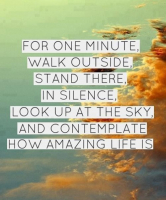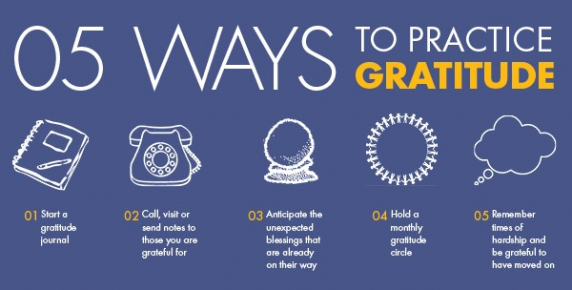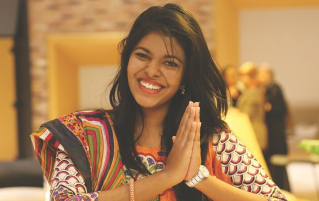The Power of Gratitude
by Barbara Prashnig
27.06.2016

“It is not joy that makes us grateful; it is gratitude that makes us joyful.”
David Steindl-Rast
The practice of gratitude as a tool for happiness has been in the mainstream for years. Long-term studies support gratitude’s effectiveness, suggesting that a positive, appreciative attitude contributes to greater success in work, greater health, more happiness, peak performance in sports and business, a higher sense of well-being, and a faster rate of recovery from surgery.
But while we may acknowledge gratitude’s many benefits, it still can be difficult to sustain. So many of us are trained to notice what is broken, undone or missing in our lives. And for gratitude to meet its full healing potential in our lives, it needs to become more than just a Thanksgiving word. We have to learn a new way of looking at things, a new habit. And that can take some time because we literally have to ‘rewire’ our brains for creating new thoughts which then will become new habits.
That’s why practicing gratitude regularly makes so much sense. When we practice giving thanks for all we have, instead of complaining about what we lack, we give ourselves the chance to see all of life as an opportunity and a gift.
Remember that gratitude isn’t a blindly optimistic approach in which the bad things in life are whitewashed or ignored. It’s more a matter of where we put our focus and attention. Pain and injustice exist in this world, but when we focus on the blessings of life, we gain a feeling of well-being. Gratitude balances us and gives us hope.
There are many things to be grateful for: colourful autumn leaves, legs that work, friends who listen and really hear, chocolate, fresh eggs, warm jackets, tomatoes, the ability to read, roses, our health, butterflies, sunshine, a beach walk. What’s on your list?

Some Ways to Practice Gratitude
- Keep a gratitude journal in which you list things for which you are thankful. You can make daily, weekly or monthly lists. Greater frequency may be better for creating a new habit, but just keeping that journal where you can see it will remind you to think in a grateful way.
- Make a gratitude collage by drawing or pasting pictures.
- Practice gratitude around the dinner table or make it part of your night-time routine.
- Make a game of finding the hidden blessing in a challenging situation.
- When you feel like complaining, make a gratitude list instead. You may be amazed by how much better you feel.
- Notice how gratitude is impacting your life. Write about it, sing about it, express thanks for what you already have.

And Oxford University Press gives this beautiful definition: “Being grateful to others has been demonstrated as a quality which enhances well-being in life.”
Just five minutes daily is all it takes to rewire your brain and unleash everything great in your life – and it starts with Gratitude!
By practicing awareness of the positive things in life, we fight off the brain’s natural tendency to scan for and spot the negatives.
As a result, we train our brains to be more positive and thus happier.

When you write about a happy event, your brain relives that good feeling.
And when you focus repeatedly on something that feels good, your brain rewires itself to do that more effortlessly in the future.

In regard to style diversity I’m wondering if there is a difference between analytic/more left-brain dominant, logical people or holistic/more right-brain dominant, creative people when it comes to feeling, experiencing, practicing or showing gratitude. But no matter what your style is, expressing gratitude will have many benefits for yourself and others

Proven Benefits of Gratitude
Increased Happiness
A daily gratitude journal can increase your long-term well-being by more than 10 percent. That’s the same impact as doubling your income!
Improved Relationships
Gratitude makes us nicer, more trusting, more social, and more appreciative. As a result, it helps us make more friends, deepen our existing relationships, and improve our marriage.
Improves our Health
Daily gratitude improves sleep, increases your energy levels, reduces stress, and can decrease blood pressure. There is even reason to believe gratitude can extend your lifespan by a few months or even years.
Boosts Your Career
Gratitude helps you network, increases your decision making capabilities, increases your productivity, and helps you get mentors and protegés.
Strengthens Emotions
Gratitude reduces envious feelings, creates happier memories, and helps us bounce back from stress.
Makes us looking good
Gratitude “recruits” other positive emotions and forgiveness comes easier. Also, negative emotions - like anger, jealousy, greed, and fear - fade. All this shows in your appearance.

There are some interesting websites to visit if you are interested in getting a little bit of ‘electronic’ help in practicing gratitude on a daily basis.
Gratitude Lounge on http://www.gratefulness.org/ and describes their services as a brand new space to post pictures, poems, videos and reflections that are inspired by feelings of gratitude and living gratefully.
And this website http://www.gratitudelog.com/ offers a community for spreading gratitude and appreciation. As they say: Welcome to the Happiest Place on the Internet. It is open to shiny, happy people, businesses, and organizations the world over.
As I am very grateful for the opportunity of writing new blogs I would like to thank all my readers for taking an interest in these various topics and hope they will add knowledge and enrich your life

Your feedback is important to us
What do you think about this blog article? We look forward to your feedback and welcome your ideas.

About Barbara Prashnig
Professor Barbara Prashnig, a pioneer und visionary in the field of style diversity in leaning and working as well as professional development. Her passion is to help people in difficult situations succeeding through better self knowledge. She is the Founding Director and CEO of Creative Learning Systems in Auckland, New Zealand.
